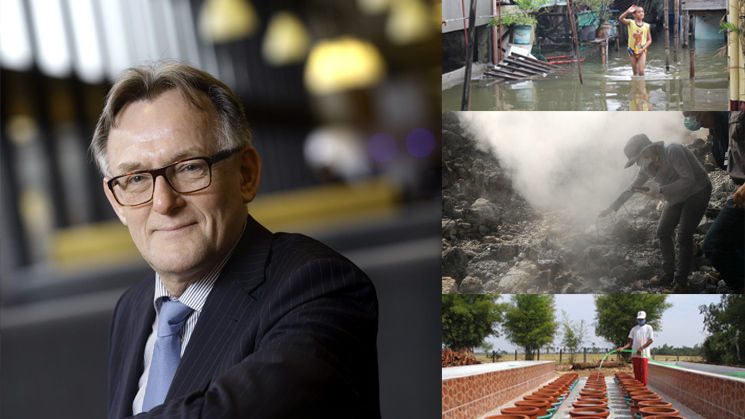Farewell Dean Bert Geerken

Prof. Bert Geerken, Dean of the Faculty of Civil Engineering & Geosciences, is retiring in May 2018. On the occasion of his departure, he wishes to boost the subject of global sustainable development one last time. Therefore, the Faculty of Civil Engineering & Geosciences and TU Delft | Global Initiative organize a symposium on Global Development. This symposium is followed by the farewell reception. Would you like to attend one or both parts of this event? Please register before 20 April 2018.
“Through this symposium, I aim to inspire civil engineers and geoscientists to find concrete solutions for worldwide problems. Let’s make impact!” Prof.dr. ir. Bert Geerken.
Donations instead of gifts
There is no need to bring a gift to either the symposium or the reception. Instead, Bert Geerken would prefer donations to three global development projects. Three researchers will pitch their concrete solutions for worldwide problems at the symposium. Will you help them make impact? Contribute to their projects now!
How does it work?
There’s no need to pick one project– your donation will be split between all three solutions. During the symposium and the farewell reception, you can vote on the project you think should receive the largest amount. All contributions will be divided according to the outcome of this voting process.
Read about each project in the tabs.
Floating Homes for the Philippines
What is it like to have wet feet twice a day? In the overpopulated deltas of the Philippines, people live in areas that experience daily flooding. The floods are caused by a combination of tides, heavy rainfall and land subsidence (the sinking of land), and are worsening due to climate change, population growth and the low quality of the current housing.
We believe that floating and amphibious housing is the future. Living with the water allows for natural water runoff ecosystems, while the inhabitants can live safely and comfortable above ground. Based on our field research in Pampanga, the Philippines, we have designed the Finch Floating Home. In order to build the first prototypes we need your help. Donate and become part of our community. You will stay up to date on the building process!
Learn more? Read the Global Story of Pieter Ham
Goals:
10,- will fund the screws for one wall
100,- will fund a locally produced sustainable roof panel
1000,- will fund a durable and replaceable floating foundation
Geothermal exploration on the island of Flores, Indonesia
Improving the living conditions of local communities on Flores with sustainable energy
Indonesia, with its numerous active volcanoes, hosts a considerable geothermal potential which is still hidden in many islands of the country. TU Delft has been active since 2014 to help build capacity in this domain in Indonesia, but a lot still needs to be done.
The first stage to assess the geothermal potential area is a basic geological mapping and sampling focussed on rocks, fluids and gases and to investigate whether there is a demand for the generated power. Together with the University of Yogiakarta (UGM) we would like to organise such a field survey on the Island of Flores to explore Volcano Inerie. Furthermore, we wish to organise a mobility program for master students to visit TU Delft and work on the samples collected together in the field and in the TU Delft laboratories.
Learn more? Read the story on geothermal energy in Indonesia
Goals:
€10 will fund a geochemical laboratory test on the collected samples.
€100 will fund an Indonesian colleague’s participation in the local field exploration.
€1000 will fund a visit for an Indonesian MSc student to work in the TU Delft laboratories.
Drinking water technologies for global development
Access to safe drinking water is a global challenge, particularly affecting the rural poor in developing countries. Within the Sustainable Development Goals there is specific emphasis on the fact that people should not only have access to water, but also to safe water – according to the international accepted guidelines of the World Health Organisation. This urgent problem requires smart, new solutions today for the removal of a wide range of contaminants: e.g., arsenic, fluoride, pathogens and antibiotic resistant genes. With the new “TU Delft Global Drinking Water programme” Doris van Halem is accelerating the development of new drinking water technologies by stimulating early-stage field research in the developing country context. The combination of solid scientific research in the Waterlab of TU Delft and the hands-on field research has proven to speed up technology development, as well as local end-user engagement and technology adoption.
The programme is kicking-off with PhD projects on low-cost virus removal with ceramic membranes in Nicaragua, arsenic removal from groundwater in Bangladesh and smart phone participation in rural India. The projects are designed to specifically include BSc and MSc Civil Engineering students of both TU Delft and the target countries to strengthen the project and stimulate capacity building. At present the programme is investing in a mobile water lab – “a water lab in a suitcase” – to overcome the practical hurdles of measuring different water quality parameters in the field.
Learn more? Read the Global Story on Doris van Halem
Goals:
5 euro: full-day TukTuk rent for field research of students
50 euro: five water quality tests for enhanced virus removal in Telica, Nicaragua
250 euro: construct new tubewell + pump for arsenic removal pilot research in Rajshahi, Bangladesh


